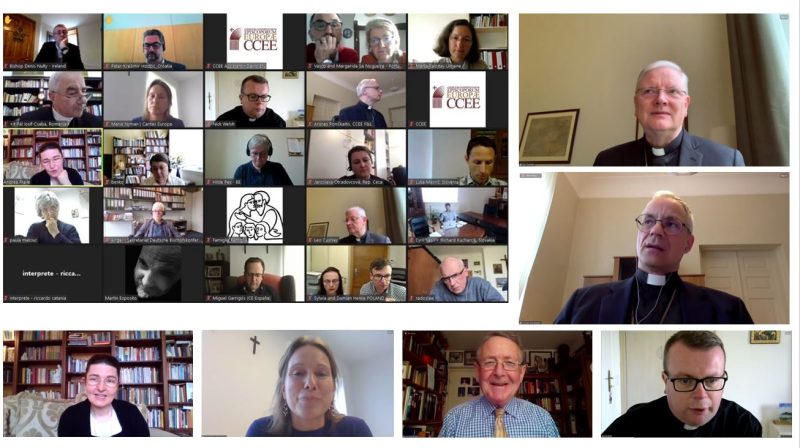On 6 May 2024 the Family and Life Commission of the CCEE organised an online conference for delegates of European Bishops’ Conferences entitled, ‘I have come so that they might have life and have it to the full’ (John 10:10): Promoting the Three Stages of Life. 30 delegates joined from 20 Bishops’ Conferences to hear the three speakers give their presentation regarding each of the three stages of human life.
The first to speak was Sr Andrea Fraile of the Sisters of the Gospel of Life, Scotland, UK. The title of her intervention was Birth and Pre-Birth Care: The Choosing of Life. Sister spoke of the apostolate of her congregation and how it was established in order to preach the Gospel of Life in the midst of the culture of death. She spoke of how many women who are facing a crisis pregnancy feel isolated by multiple factors and they therefore have no choice but to abort their child. As well as providing for the material needs of those facing, the sisters work to reduce the sense of isolation experienced by the women to help them see that keeping their child is a viable choice. Sister spoke also of the post-abortive care provided to women and men through, among others, the Rachel’s Vineyard retreat program. She highlighted other aspects of her community, including the evangelisation of the culture: she noted that while, for example, the overturning of abortion as a constitutional right in the USA has been welcomed, it was clear that the culture of the USA was not ready for this. The long-term goal of the pro-life movement, therefore, must be the shifting of societal attitudes to help people understand that abortion is not necessary. Sister concluded encouraging unity among those involved in the pro-life movement as well as charity to those opposed.
The second intervention came from Dr Maria Nyman, the General Secretary of Caritas Europe whose talk was entitled Care Throughout Life: ‘Love your neighbour as yourself’ (Mt 22:39). As well as giving an overview of the work of Caritas Europe, which currently includes working in Ukraine as the largest single provider of aid, Dr Nyman spoke of the philosophy of the organisation as being based on the principle of ‘See-Judge-Act’. Dr Nyman emphasised the importance of ‘encounter’ in the work of Caritas which creates a space for those on the receiving end of Caritas’ work to encounter Jesus Christ. It is only through encounter that hope can be brought to the poor, for it is in personal encounter with those engaged in charity that people can encounter charity in Jesus Christ. And she concluded by saying that the fullness of life that flows from the encounter with Jesus Christ in other people comes through the concrete things one does for one’s neighbour.
The afternoon presentation was given by Lord David Alton, a member of the British House of Lords and a life-long advocate for many human rights causes, especially against euthanasia. Lord Alton spoke on End of Life Care: The Grace of a Happy Death. Lord Alton warned against arguments in favour of euthanasia based on autonomy and mercy, pointing out that in every jurisdiction where euthanasia has been permitted it has always become a dangerous contagion that threatens the safety of vulnerable people and compromises doctors. He cited the examples of Canada, Belgium and the Netherlands. In the face of pressure to introduce euthanasia in many parts of the world, the answer, Lord Alton argued, must be superlative palliative care. Addiction, he said, is not a cause for shame and society must realise that caring for those who are weak and marginalised is a sign of a strong and healthy society. Lord Alton called for a society where unconditional love is the norm, rather than an implicit message that we would prefer those who are considered a burden to be dead. Instead of expending their energies promoting bad laws, legislators, politicians and governments should work towards world-class palliative care and resources for healthcare that values assisted living rather than hastening death. Only this will guarantee the grace of a happy death.
Ample time was given to debate after each report. Delegates returned virtually to their home countries, hoping to be inspired and better equipped to take the Good News of the fullness of life found in Christ – from conception, throughout life, until natural death – throughout Europe.
Rev Nick Welsh
Secretary of the Commission

